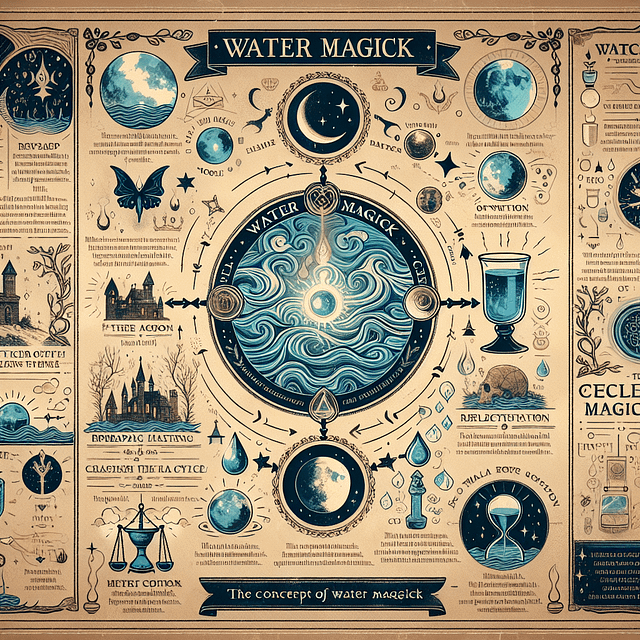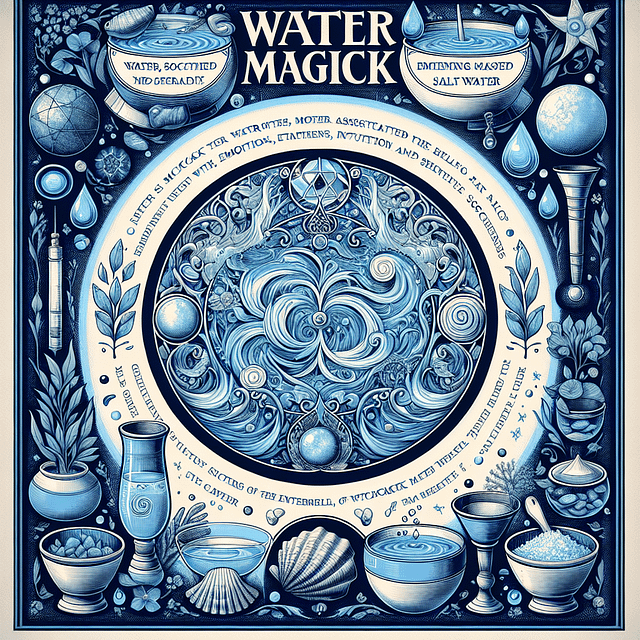As an Amazon Associate I earn from qualifying purchases.

Water magick, often referred to as “hydromancy,” is an ancient form of divination that interprets patterns seen in water. Its origins can be traced back to civilizations that viewed water as a sacred element, capable of reflecting the future and hidden truths. Through various rituals and observances, practitioners have sought to gain insights by interpreting ripples, waves, currents, or the reflective surface of water. Across cultures and time, this mystic art has evolved, yet it remains enshrined in modern magical practices, highlighting our enduring fascination with the element's perceived mystic properties.
One intriguing aspect of water magick is its association with the moon, especially considering the lunar cycle's influence on tides and water behavior. Practitioners often perform rituals during specific phases of the moon to harness its power, aligning their activities with the waxing or waning periods to attract or repel energies. This celestial relationship underscores the interconnectedness of natural phenomena in magical practices and the importance of timing in conducting rituals that seek to tap into the forces of the universe.
Moreover, in many cultures, crossroads near water bodies are thought to be potent spots for conducting water magick, believed to be places where different realms intersect. This idea suggests that energies gathered at such junctures are amplified, providing a powerful conduit for magical workings. By choosing these specific locations, practitioners aim to harness the spatial and metaphysical properties of water, further enhancing the effectiveness of their endeavors.
An engaging statistic related to the use of water in magical practices is the sheer variety of rituals that incorporate this element. There are over a hundred documented spells and rituals that involve water in some form, ranging from simple practices like scrying in a bowl of clear water to elaborate ceremonies involving the release of objects into the sea. This diversity not only shows the adaptability and creativity within the magical community but also indicates water's universal role as a vessel for intention and transformation.
Water magick also can include the use of various additives to water during rituals – herbs, stones, and dyes that are believed to enhance the power or direct the intention of the workings. The choice of these substances is often highly symbolic, and the colors or properties of the additives can correspond to specific desires or outcomes. For example, adding rose petals to water might be aimed at invoking love, while a pinch of salt might serve to purify or protect.
Beyond its practical applications, water magick also serves as a symbolic narrative for the flow of life and the cycles of nature. In many traditions, water is the quintessence of change and adaptability, with its ability to move around obstacles, find new paths, and transform from solid to liquid to gas. This symbolic parallel allows practitioners to meditate on the nature of change and the dynamics of their own lives, making water magick a tool for personal reflection as well as a means to influence external circumstances.
“`html
What Are 6 Captivating Facts About Water Magick You Need to Know?
“`
Water Magick is an ancient practice that involves using water as a tool for healing, purification, divination, and transformation. This mystical art form is based on the belief that water, as an element, holds significant energetic properties that can influence both the physical and spiritual realms. The six fascinating facts about Water Magick will introduce you to its core principles, including the use of charged water for intention-setting, the historical significance of water in various cultures for rituals and ceremonies, and the role of natural bodies of water as sources of mystical power. These insights serve as an entry point into understanding how Water Magick operates and its potential benefits. In the following sections, we will dive deeper into each of these tantalizing aspects of Water Magick, exploring the depths of its ancient wisdom and current applications.
Water Magick, an ancient practice that draws upon the elemental energies of water, has been a part of mystical traditions for centuries. Those who practice water magick believe that this element is deeply connected to emotions, intuition, and the subconscious mind. Here are six intriguing facts about water magick that illustrate its significance and complexity.
**Historical Significance and Cultural Presence**
Water magick has been present in various cultures and traditions throughout history. From the sacred Nile River in Egyptian mythology to the healing spas of Roman times, water has always held a sacred place in spirituality and ritual. In many indigenous cultures, water is considered the lifeblood of Mother Earth, and rituals involving water are conducted to bring healing, purification, and balance to individuals and the community.
**Association with the Moon**
Water magick is closely tied to lunar cycles. Practitioners often time their rituals with the phases of the moon, as the moon governs the tides and has a strong influence on water energies. The full moon, in particular, is considered a powerful time for conducting water magick, as it’s believed to amplify the energy and potency of water-related spells or rituals.
**Varied Forms and Uses**
Water magick can take many forms, including but not limited to baths, washes, blessings, and divination. Ritual baths might be taken for purification, to attract love, or to bring healing, depending on the herbs, salts, and intentions used. Similarly, water can be charged with specific intentions and then used to anoint people, objects, or spaces for blessing or protection.
**The Four States of Water**
Practitioners of water magick recognize and utilize the four physical states of water – liquid, solid (ice), gas (steam), and plasma (ionized gas) – to correspond with different types of energies and magickal work. While the liquid state is most commonly used for cleansing and purifying, ice can symbolize stillness or slowing down an unwanted circumstance, steam might be used for transformation, and plasma for high-energy work.
**Tool for Meditation and Scrying**
Many water magicians use the element as a tool for meditation and scrying, which is a method of divination. By gazing into a bowl of water or observing the patterns and waves in a body of water, practitioners believe they can receive insights, visions, or messages from the spiritual realm.
**Water Deities and Spiritual Entities**
Many cultures have deities specifically associated with water, such as the Greek god Poseidon or the Yoruba goddess Yemoja. These deities are often invoked during water magick rituals to lend their power to the practitioner's intentions. Additionally, spirits, or entities like nymphs, mermaids, and undines, are believed to inhabit waters and are considered by some to be powerful allies in water magick.
Ending with a statistic, a study from “The Journal of Alternative and Complementary Medicine” found that in 2006, nearly 62% of American adults had used some form of complementary or alternative medicine, which often includes practices associated with spirituality and nature-based traditions like water magick. This number has likely grown as more people seek holistic approaches to wellness and spirituality.
1. What is Water Magick?
Water Magick, also known as water witchery or aquamancy, is a form of magic that involves the use of water in rituals and spells to influence change or gain insights. It is based on the belief that water, as an element, holds unique properties that can be channeled for various purposes including purification, healing, and emotional work.
2. Can anyone practice Water Magick?
Yes, anyone can practice Water Magick. It does not require any innate abilities, but instead, a willingness to learn and respect for the natural elements. It is recommended to study and understand the principles and ethics of magic before beginning any practice.
3. Is Water Magick related to a specific religion or belief system?
Water Magick is not exclusive to any particular religion or belief system. It is a practice that can be found in various forms across cultures and spiritual paths. Practitioners may integrate it into their religious rituals or use it as a stand-alone practice.
4. What are some common tools used in Water Magick?
Common tools in Water Magick include bowls of water, chalices, cauldrons, sea shells, and sometimes specific types of water like rainwater or seawater. Additionally, items like crystals, herbs, and oils that correspond to water may be used to enhance the practice.
5. What do I need to get started with Water Magick?
To get started with Water Magick, you simply need water and a clear intention. Some basic items that can help include a bowl or chalice for holding water, and perhaps candles or incense to create a focused environment. Essential oils or sea salt can also be helpful for more advanced practices.
6. Are there any ethical considerations with Water Magick?
Yes, as with any type of magical practice, there are ethical considerations. It is important to respect the free will of others and not attempt to control or manipulate them against their wishes. It's also vital to consider the environmental impact of your practice and ensure that it does no harm to natural water sources.
7. Does Water Magick involve communicating with water spirits or deities?
Some practitioners may choose to communicate with water spirits or deities as part of their Water Magick practice, though it is not a requirement. Those who do may call upon specific figures from mythology or adopt more general spirits associated with water.
8. How can Water Magick be used in daily life?
Water Magick can be integrated into daily life in simple ways, such as setting intentions while drinking water, taking a ritual bath for purification, or using charged water for watering plants. It can also be used in more structured rituals to achieve specific outcomes.
9. Can Water Magick be combined with other types of Magick?
Yes, Water Magick can be combined with other forms of magic to enhance practices or rituals. For example, it can be integrated with earth magick for grounding purposes or with air magick for intellectual pursuits. The key is to understand the different elemental energies and how they interact.
10. What are some examples of Water Magick spells or rituals?
Examples of Water Magick rituals include crafting moon water by charging water under the full moon, conducting a seance beside a body of water, or performing a ritual bath for emotional release. Spells may involve using water as a medium for manifestation or scrying for divination purposes.

Conclusion
Water Magick, steeped in ancient traditions and practices, is a captivating aspect of esoteric knowledge that continues to intrigue practitioners and scholars alike. Its connectivity to the element of water is emblematic of the flow of energy and the intuitive ties to emotions and healing. Among the six fascinating facts discussed, the symbolism of water as a gateway to the subconscious mind underscores its use in divination and reflective meditation, revealing its integral role in uncovering hidden truths. The practice of charging water with lunar energy during rituals highlights the importance of celestial bodies in empowering elemental magick, demonstrating the intricate link between the cosmos and terrestrial elements.
Furthermore, the fact that Water Magick traditions span across various cultures, from the Japanese art of Mizu no Kokoro to the Native American rain dances, showcases its universal appeal and the shared human connection to water across different traditions. The insight into using water as a means for purification and protection in rituals emphasizes water’s ability to absorb and cleanse negative energies. Such practices form the foundation of many spiritual cleansing techniques prevalent today. The adaptability of Water Magick, wherein it can be seamlessly incorporated into everyday life through simple acts like ritual baths or anointing with sacred waters, makes it accessible and practical for modern seekers. These salient points encapsulate the mystery and practicality of Water Magick, carving its place as an enduring and versatile path in the vast landscape of spiritual traditions.
Amazon and the Amazon logo are trademarks of Amazon.com, Inc, or its affiliates.


